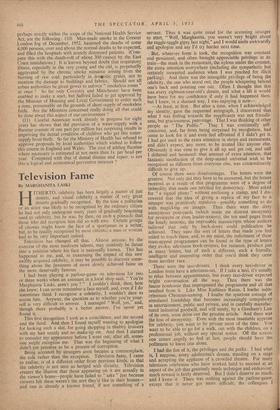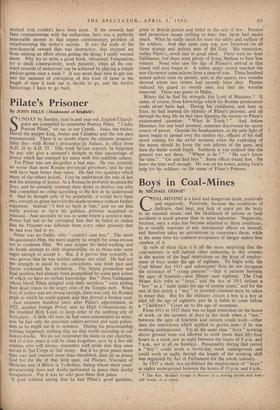Television Fame
By MARGHANITA LASKI HITHERTO, celebrity has been largely a matter of just deserts, and visual celebrity a matter of very great deserts gradually recognised. By the time a politician or an actor was likely to be recognised by the ordinary citizen he had not only undergone many years of _gradually becoming used to celebrity, but he was, by then, on such a pinnacle that those who did recognise him did so with awe. Certain groups of citizens might know the face of a sportsman or a writer, but, to be readily recognised by most citizens,‘ a man or woman had to be very important indeed. Television has changed all that. Almost anyone, by , the exercise of. the most mediocre talents, may suddenly be thrust into a position where his face is nationally known. This has happened to me, and, in examining the impact of this new swiftly acquired celebrity, it may be possible to discover some- thing about the pressures of more slowly achieved fame on the more deservedly famous. I had been playing a parlour-game on television for two or three weeks when an assistant in a local shop said, " You're Marghanita Laski, aren't you ? " I couldn't think, then, how she knew; I can never remember a face myself, and, even if I do sometimes think I recognise a celebrity, I wouldn't dare to accost him. Anyway, the question as to whether you're your- self is very difficult to answer. I managed " Well, yes," and, though there probably is a better answer, I've never yet .found it.
This first recognition I took as a coincidence, and the second and the third. And then I found myself wanting to apologise for looking such a slut, for going shopping in Shabby trousers with my hair untidy and no make-up on. And then I started to consider my appearance before I went out; after all, some- one might recognise me. That was the beginning of what I didn't yet perceive to be a process of corruption. Being accosted by strangers soon became a commonplace, the rule rather than the exception. Television fame, I came to realise, is of a different order from previous kinds, in that the celebrity is not seen as hedged with divinity. Television creates the illusion that those appearing on it are actually in the viewer's home—people have failed to " take " just because viewers felt these weren't the sort they'd like in their homes— and one is already a known friend, if not something of a servant. Thus it was quite usual for the accosting stranger to start, " Well, Marghanita, you weren't very bright about the raggle-taggle gipsy last night," and I would smile awkwardly and apologise and say I'd try harder next time.
But, whatever form it took, the recognition was constant and persistent, and often brought appreciable privilege in its train—the steak in the restaurant, the nylons under the counter, the extra attention everywhere (including the sympathetic but certainly unwanted audience when I was pinched for illicit parking). And there was the intangible privilege of being the celebrity, the one who stood out, the people whispering behind one's back and pointing one out. Often I thought that this was every eighteen-year-old's dream, and what a lift it would have been for my confidence if only it had happened then; • but I knew, in a shamed way, I was enjoying it now- -At least, at first. But after a time, when I acknowledged my identity, gave the requested autograph, I discovered that what I was feeling towards the supplicants was not friendli- ness, but graciousness, patronage. That I was thinking of other people as " The Public." That I was continually self- conscious, and, far from being surprised by recognition, had come to look for it and even feel affronted if I didn't get it. I had .got used to the extra attention in shops and restaurants, and didn't expect, any more, to be treated like anyone else. Obviously it was time to give it all up and get out, and still I dithered and hesitated; that amount of extra attention, that fantastic satisfaction of the deep-seated universal wish to be recognised as different from everyone else, was extraordinarily difficult to give up.
Of course there were disadvantages. The letters were the greatest. Not only did they have to be answered, but the letters received as a result of this programme were of a degree of imbecility that made one terrified for democracy. Most asked for " a signed photo " without enclosing a stamp, and I dis- covered that the idea of giving a replica of my face to a stranger Was primitively repulsive—possibly something to do with magicking on images. Then there were the dirty anonymous post-cards (which made me distrust anonymity for reviewers or even leader-writers), the ten mad pages from the lonely neurotic, the impossible manuscripts whose authors believed that only by back-doors could publication be achieved. They were the sort of letters that made you feel soiled to touch them, and, to my mind, the indictment of these mass-appeal programmes can be found in the type of letters they evoke; television book-reviews, for instance, produce just as many letters, but of such a different, such a friendly, intelligent and interesting order, that you'd think they came from another race.
There were the taxi-drivers. 1 think every taxi-driver in London must have a television-set. If I take a taxi, it's usually to relax between appointments, but every taxi-driver expected bright conversation all the way. Then, there was the fausse bonhomie that impregnated the programme and all that resulted from it. Like Miss Kathleen Raine, I loathe indis- criminate Christian-naming. I loathe the spurious coinage of simulated friendship that becomes increasingly compulsory in entertainment, public and private, and in carefully manufac- tured industrial goodwill, and will surely, by a Gresham's Law of its own, soon drive out the genuine article. And there was the loss of anonymity. Even with the most insatiable appetite for celebrity, you want to be private most of the time. You want to be able to go for a walk, out with the children, on a professional job, without any special notice. Off the screen. one comes angrily to feel at last, people should have the politeness to leave one alone.
I had the fun of it, the privileges and the ,perks. I had what is. I suppose, every adolescent's dream, standing on a stage and accepting the applause of a crowded theatre. For many television celebrities who have worked hard to succeed at an aspect of the job that genuinely needs technique and endeavour, much reward is fairly deserved. But I didn't deserve so much, and I knew it. There was nothing against the parlour-game, except that it never got more difficult; the colleagues I worked with couldn't have been nicer. If the rewards had been commensurate with the endeavour, here was a perfectly reasonable answer to that urgent contemporary problem of supplementing the writer's income. It was the scale of the non-financial reward that was destructive, that stopped me from making an effort about getting the things I really wanted more. Why try to write a good book, whispered Temptation, try to think constructively, work patiently, when all the out- ward rewards of endeavour can be achieved by playing a simple parlour-game once a week ? It was more than time to get out, and the measure of corruption of this kind of fame is the length of time it took me to decide to go, and the furtive hankerings I have to go back.



































 Previous page
Previous page